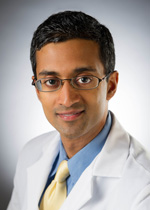
Dr. Isaac George, MD joined NewYork Presbyterian/Columbia University Medical Center in the Department of Surgery in July of 2001 as an resident in general surgery following his graduation from Duke University School of Medicine. Prior to receiving his MD, Dr. George completed a B.S. in Mechanical Engineering at Massachusetts Institute of Technology in 1997. Dr. George also completed a fellowship program in cardiothoracic surgery in 2010 as well as a fellowship program in interventional cardiology/hybrid cardiac surgery in 2012. In July, 2012 Dr. George became an Assistant Professor of Surgery.
Dr. George has performed over 1500 open heart operations. He is focused on integrating new technology and innovation into his clinical practice and is trained in the must current and cutting edge procedures including Transcatheter Aortic Valve Replacement (TAVR). Dr. George is trained in multiple disciplines and is able to combine strategies to create a personalized treatment for each individual patient.
His clinical practice allows him to be uniquely positioned to advance this research with a clinical endpoint and potential therapeutic intervention as the goal. The first objective of his research is to investigate the regulatory mechanisms of myostatin (a negative regulator of muscle growth) to insulin-like growth factor-1 and its role in cardiac hypertrophy and cardiomyopathy. Specifically, his group is the first to report the importance of myostatin activation in heart failure. He is also examining TGF-? related mechanisms of ascending aortic aneurysm formation in patients with non-syndromic aortopathy. His hope is to delineate exact downstream effects of angiotensin receptor blockade on TGF-? protein, MMP, and aneurysm-specific microRNA expression. His lab is testing the hypothesis that local mechanisms of valve calcification persist after TAVR when compared to surgical valve replacement, which may ultimately affect valve durability.
All three projects reflect the translational nature of the lab as well as his clinical interests. His clinical practice allows him to be uniquely positioned to advance this research with a clinical endpoint and potential therapeutic intervention as the goal.
| Condition | Study Title |
|---|---|
| Mitral Valve Disease | The MITRAL II Pivotal Trial (Mitral Implantation of TRAnscatheter vaLves) |
